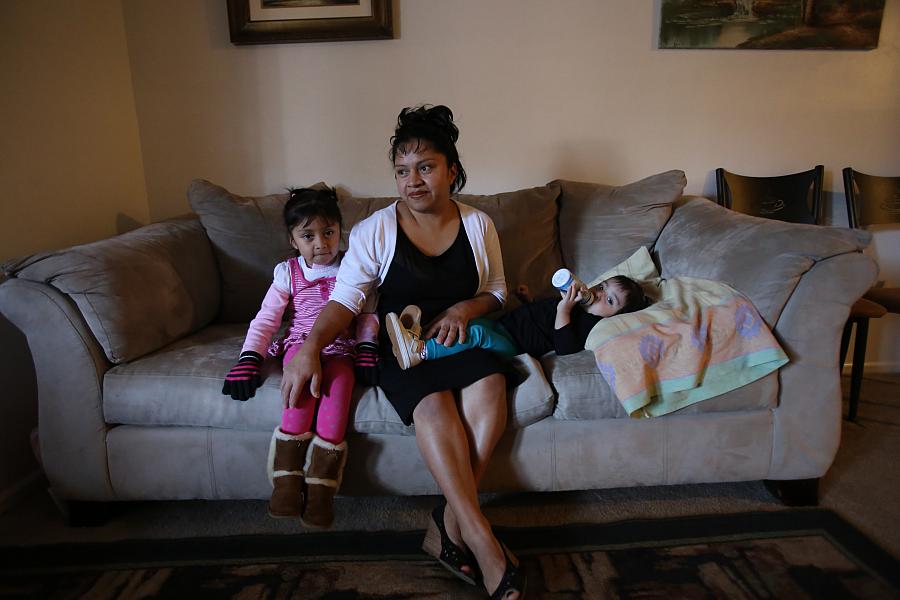Lessons From Reporting on Families Coping With Deportation

It was the most heartbreaking moment of my project, when I heard 11-year-old Jennifer Barajas crying, saying that the police were separating her from her father, who had been arrested in Forrest Park, Ga., and was waiting to be deported. Jennifer, her mother Reyna Paniagua, and her younger brothers and sister were in despair. The provider of the home was in jail, and they didn’t know what the future would hold for them.
When I started to look at how deportations affect the mental health of the families left behind, I didn’t have any difficulty finding families. I noticed that in Georgia, and especially in Gwinnett County, this is a very common story. But I also found the impacts of family separations haven’t been adequately measured.
For four months I interviewed families who’d been affected by the deportation of a father or spouse. I also interviewed professionals: teachers, psychologists, attorneys and community organizers who work with these families.
Through my project, two aspects of the families separated by deportation caught my attention. According to experts, the children are the most devastated (Spanish version), and in many homes the mothers are not prepared to provide for the family when the father is no longer present.
Many mothers don’t want to go back to their home countries because they think that the best opportunities for their children, many of them American citizens, are here.
As I did my reporting, it struck me how often the children in such families started to have nightmares, screamed at night, and got sick in the wake of the father’s deportation. Experts such as Laura Marantz, school counselor at Berkeley Lake Elementary School in Duluth, Ga., compared the experience of deportation with the death or divorce of one’s parents. “The children experience grief in many ways,” Marantz said. “They feel shock … They can feel anxious, depressed.”
The schools refer many of these kids to psychologists or counsellors, but parents such as Dionila Roblero, a Guatemalan whose husband was deported in 2012, often don’t seek any counseling or therapy. Roblero and other women found needed support in their faith communities or in their neighborhoods.
There’s still a lack of information among families about services and organizations available to help if they need mental health services. And some still avoid seeking psychological help due to the stigma associated with it.
In Georgia, there’s a need for more bicultural and bilingual experts who can help these families, as well as more community organizations who can take the family through the process of getting the services they need after the deportation of the fathers.
In the process of gathering my information, I faced two barriers:
- A lack of reliable data. Immigration and Customs Enforcement (ICE) gave me statistics on the number of deportations in all their field offices from 2008 to 2013. They also shared the data on the number of deportees with children, but those statistics were not accurate because there is not a standardized questionnaire for collecting information about the children. Also, the immigrants who have been detained by authorities may not want to reveal information about their family. According to ICE, 99,845 people were deported in Georgia between 2008 and 2012. However, according to the agency, only 7,947 of those had children.
- The lack of studies on the topic. I found some academic research about deportation and mental health, but it was not about Georgia and it was from smaller, very specific communities. There is a need for more research.
In my series, I tried to reflect the experiences of these immigrant families in such a way that readers can identify closely with their struggles. This is my advice to other reporters working on similar projects:
- Find the right people. Community organizations, churches, immigration activist groups, support groups, and consulates are good places to find your stories.
- Look for stories of strength. The resilience of the families that I interviewed is an aspect worth highlighting. Stories like that of Dionila Roblero, who started to sell food and care for children in her home to support her family. Families must find ways to carry on with their lives without the presence of the deported father, and it’s important to highlight the successes and report on what’s working for them.
- Let the people tell their stories. The voice of Jennifer Barajas was one of the most powerful in my story. I was not planning to interview her because she is a minor, but her mother was the one who ask her if she wanted to speak with us about her feelings regarding her deported father.
- Look for less-explored aspects of your topic. When I interviewed psychologist Alonso Romero, I didn’t know much about the use of psychological reports at the immigration courts. My intention was only to interview Romero as an expert for my first story, but I wrote a second story specifically about these evaluations and the impact they can have.
- Find the best data and ask the experts. When I noticed that the data ICE gave me about the deportees with children was too low given the totals, I interviewed some experts about those numbers. “The vast majority of people in the process of deportation or who have been deported recently — probably 90 percent of these people — have children,” said immigration attorney Carolina Antonini. “Those government numbers are not, in my opinion, trustworthy.”
- Find the ways families cope. Remain open to the particular strategies that people use to overcome the difficult situations they encounter after the deportation of a family member. They might not use all the available services, such as counseling, but that doesn’t mean that they are not utilizing other strategies to cope with their despair. Often that could mean finding help through family members, friends, their church, social organizations or their community.
